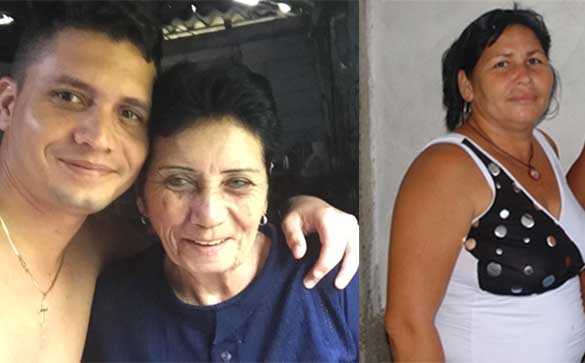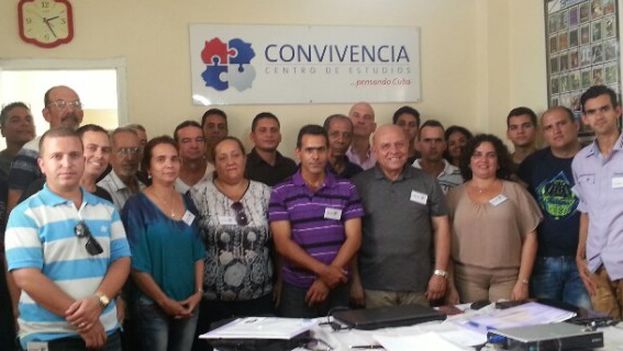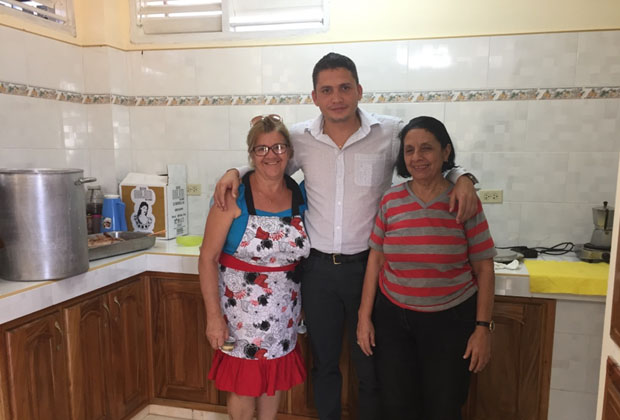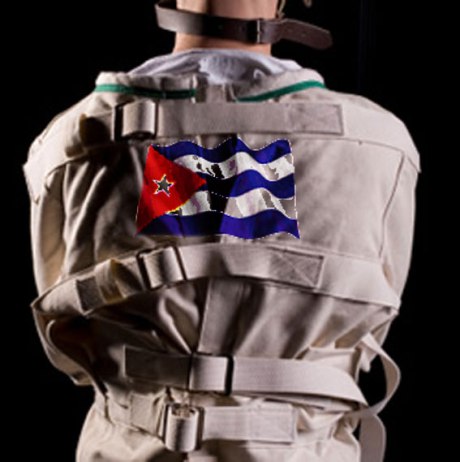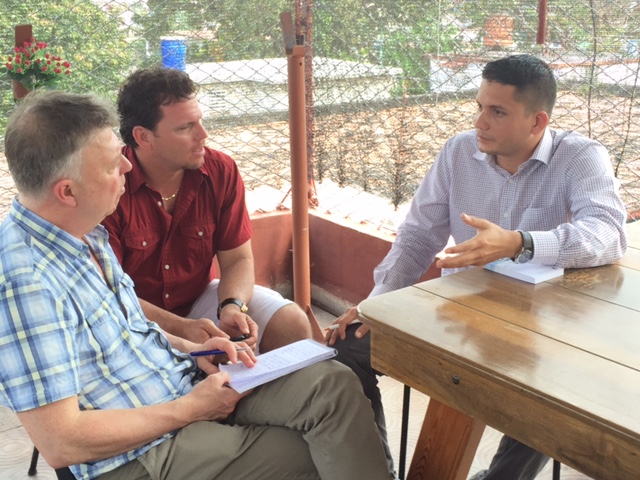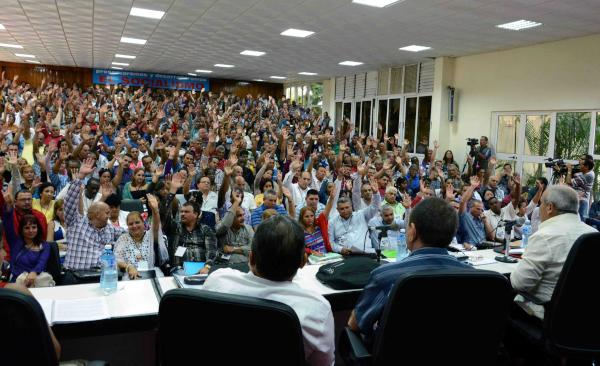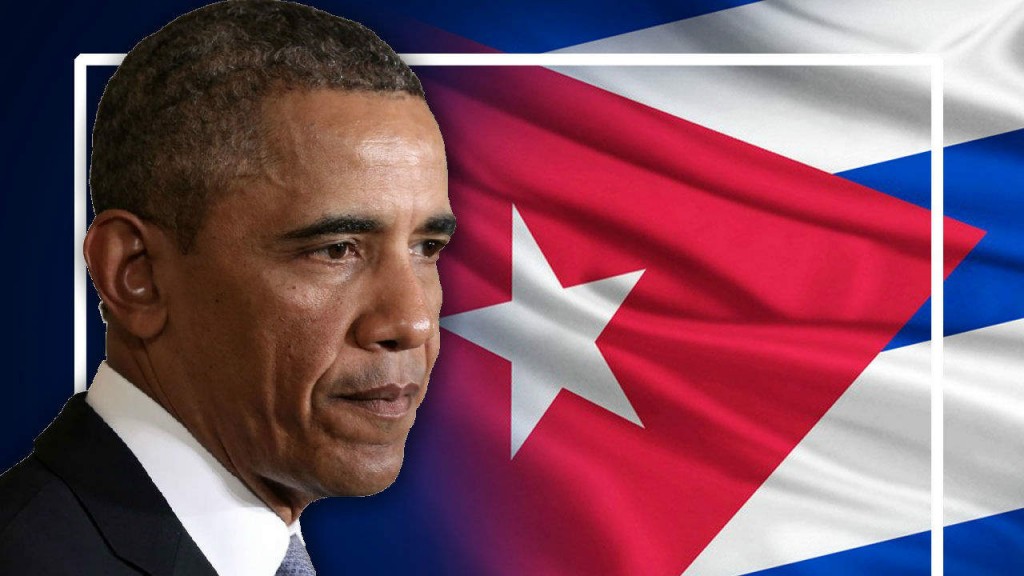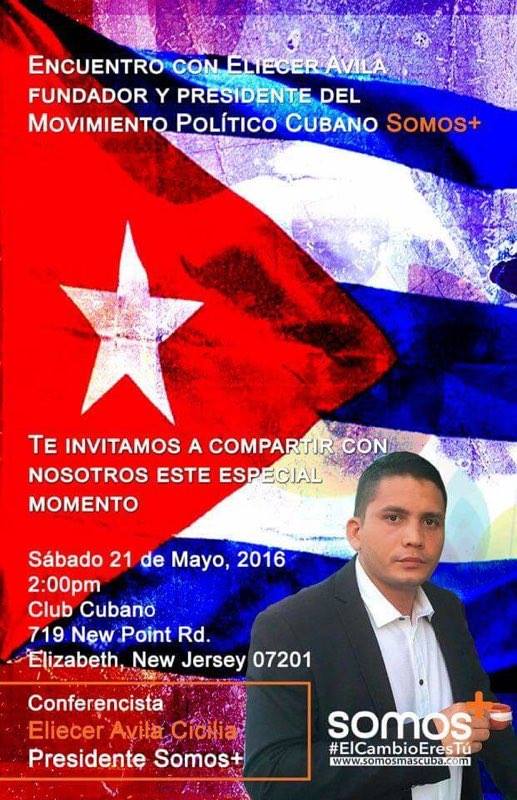 Somos+, 17 May 2016 — On Saturday, May 21, at 2:00 p.m., at the Club Cubano de New Jersey (New Jersey Cuban Club), the president and founder of Somos+ Political Movement, will give a lecture about current issues in Cuban society. After several months of efforts, this meeting is possible thanks to the cooperation of the members residing in the U.S. You are all invited to this meeting and debate. Hoy Somos+.
Somos+, 17 May 2016 — On Saturday, May 21, at 2:00 p.m., at the Club Cubano de New Jersey (New Jersey Cuban Club), the president and founder of Somos+ Political Movement, will give a lecture about current issues in Cuban society. After several months of efforts, this meeting is possible thanks to the cooperation of the members residing in the U.S. You are all invited to this meeting and debate. Hoy Somos+.
Author: Somos+
The Cuban Exile is Young, and It Hasn’t Died / Somos+, Javier Martinez
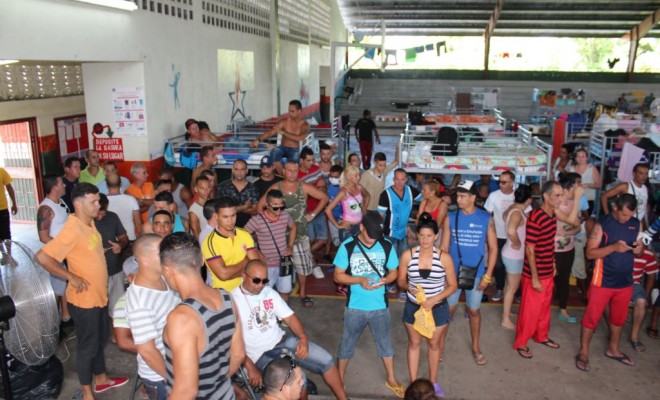
Somos+, Javier Martinez, 9 May 2016 — The Cuban exile is not dead. I am 28 and I live outside my country for political reasons, so I consider myself an exiled Cuban. The Cuban exile has not died, and will not die as long as we Cubans have to leave our country to seek in other countries what the dictatorial government of the Castro brothers and their clique has denied us for more than six decades. I can agree that the exile now is different, but it hasn’t died, and it will not die as along as dignified Cubans are fighting for the future of their country.
To put this in context, some days ago a text circulated on social networks referring to the death of the Cuban exile.
Starting from a situation that since the 1990s has plagued Cuban emigration: all the Cubans who are benefitting under the Cuban Adjustment Act, ask for political asylum from the emigration authorities when they reach the borders of the United States but, the truth is, these new emigrants when they receive their residency permits after a year and a day, return to visit Cuba, and the vast majority of them do nothing to achieve the political freedom of the country they were forced to leave. continue reading
We cannot cover the sun with a finger, the Cuban exile has changed, and greatly. At the beginning of the Revolution the majority of exiles were from the upper class, Cubans whose property had been expropriated, members of Batista’s military, intellectuals, and also those who could see, from the first months, the socialist and communist direction the country’s leadership was taking. Today the people leaving Cuba are not only those opposed to the government, but also those who want to escape from the shortages, the neglect and the bad treatment from the government.
The vast majority of the emigrants of today prioritize their personal wellbeing above politics, even when sheltering themselves under a law that shelters them for political reasons. We could say that only one is ten is tied to opposition organizations in exile, not an exact figure, but Somos+ is a living example that not all are economic emigrants, as many of the Cubans now leaving the island are called; some, when they leave Cuba, are expressing their desire to fight for freedom.
We know that the exile has changed, these are not the years when exile groups planned armed actions from Miami. The exile has also changed, in many ways, like Cuban society has changed. The forms of struggle have moved to the social networks and today’s weapons do not assault directly; now they transform, educate, show Cubans on the island that change is possible through civic struggle, through a knowledge of our rights and a study of our duties, which leads to a gradual transformation of an entire society.
To clarify, this does not mean that the young people of the exile–and when I refer to them I am speaking on behalf of dozens of friends who belong to Somos+ and live in the United States, Spain, Ecuador and Switzerland, to mention some of the countries where young Cuban opponents to the Castro government live–are trying to occupy a space that the historic exile might say belongs to only a few, on the contrary, we want them to open its doors to us.
We call on this historic exile that some pretend has died, to join our ranks, we want to learn from them and show them that today we believe in a path that could lead us to achieving what they have been fighting for for years: full freedom for Cuba. A freedom where the rights of everyone to think differently are respected, even if we don’t agree with their ideas. That is, those who try to force us to think in a unilateral way, their time is past.
We young exiles who now form a part of the opposition to the socialist government do so from the deepest democratic convictions, and thus we respect the personal right of every person to decide what to do with his or her life, but of one thing we are certain: the exile has not died, as long as Cuba is not free we will continue to fight for the ideals of justice and freedom that we desire for our people.
For Mima, the Best Kiss… / Somos+
Somos+, Eliecer Avila, 8 May 2016 — First of all I want to send a huge kiss to all the mothers of the world, and especially the Cuban mothers, many of whom cannot sleep peacefully knowing that a mysterious black wolf called State Security stealthily monitors their young children day and night.
Among these mothers is mine. Or all of mine… because I have several. The one who gave birth to me from whom I was separated by divorce when I was three (although we still see each other), the one who raised me, my grandmother (Mima), my aunt Arelis, perennial guardian of the entire family; at least two memorable stepmothers whom I love very much, and dozens of mothers who have appeared to me recently because according to them they pray for me every night and have adopted me as their son.
But today I want to talk about Mima, because she is now almost 70 and every day she fills my thoughts. It has been five months since I last saw her, because of the 450 miles that separate us since the end of 2013 when I came to live in Havana. At times it’s hard even to talk on the phone because I know that sooner or later she is going to ask the question that causes a lump in my throat, “M’ijo… when are you coming?” continue reading
Recently, seeing me come through the door is her moment of greatest happiness. I could almost say she lives for this day. She keeps for me in the fridge a little piece of each chicken she kills on the yard, spared from her own little pounds (a tiny checkbook), and I don’t know how she manages to have for me “pineapple juice that you like, powdered milk and even a little piece of red meat…” All luxuries that she can’t give herself during the time we are apart.
When I see her, along with my grandfather (Tata) I can’t help feeling some remorse and a sense of guilt. I don’t know if I have to the right to build my own life, going far away to look to improve to, for access to culture and work opportunities. I have tried a thousand times to convince her to come with me, even if just for a time, because I want to give her the first day of the rest in her entire live and take care of her as she always did me, but there is no one who can get her off the farm and she is an expert in manufacturing pretexts…
I also wonder how it is that, living on an island, we can feel such a strong sense of distance. I am convinced that it would be a whole different thing if instead of this absurd government we had a normal one. We would have access to hundreds of technological tools that would allow me to see her face and talk with her a little bit at night, persuade her to eat more and work less, ask her how the services went in the little church she attends, where sometimes she even preaches and constantly fasts for her children and grandchildren. Now my aunt tells me she has become infatuated with the idea of my grandfather “having women out there…” Which he denies saying, “If only…” ha ha ha. How I would love to laugh and enjoy every day with them.
This situation makes me think of the thousands of children who are in other countries, while their mothers are here, sometimes sick and always getting older. The family crisis this country has been experiencing for decades is really terrible.
This morning I went to Monaco Park, one of the wifi points in the Capital, and it was even fuller than usual, which makes sense. But what most struck me was a woman of some 90 years in a wheelchair and with an IV drip at her side. She got out of a Moskovich car with the help of several family members who put a tablet in front of her to share with her what was probably her last wish: to see her son who lives in Orlando whom she hasn’t been able to hug for 27 years.
On the other side of the screen was a gray-haired gentleman surrounded by two sons and a newborn granddaughter, crowded together on a couch, trying to say something but unable to do so. Several minutes passed without a word, the tears never stopping and then a sister’s cracking voice, “Mama, say something, the [internet] card is going to run out…” The old woman tried to compose herself and then the words I hear so often and that pain me emerged, “M’ijo… when are you coming to see me?” and she added, “I’m waiting millet.”
I couldn’t take it any more, I closed the computer and left to walk the mile and a half from the park to my house. Determined to find a way to go and see my grandmother and my mother this month. It is really very hard that so many Cubans are forced to bear this damned circumstance, simply because some men retain for themselves the desire to keep this country in the dark ages of technology on one side and in material and spiritual poverty on the other, distancing thousands of children from their mothers every day.
I will never understand by Fidel preferred to separate rather than unite, to discriminate rather than protect, to hate when he could have used his charisma to support the Cuban people to cultivate love, togetherness, the family and pride in being Cuban.
There is a great deal we can do for our mothers as a new generation that clings to its natural right to participate in the politics of the country. We hope that very soon we will have that opportunity and we will live up to such an honorable responsibility.
Here I share photos of my mother and grandmother. And I invite everyone to share on this day images of your mothers, those here and those who care for us from above, those far away and those at our side. Let us fill all the spaces today with their sweet faces.
This Time I Reached Pinar de Rio / Somos+, Eliecer Avila
Somos+, Eliecer Avila, 26 April 2016 — The last time I tried to meet with several families in this province I was forcibly “deported” by State Security agents, who told me I was “persona non grata” in the territory. It is very likely that no citizens had heard of the action taken against me, because today I noted the astonishment and indignation of many upon learning those facts. “You are welcome here and everywhere,” I was told by the wonderful people who welcomed me this time.
Obviously, State Security and the Communist Party do not represent the views of the vast majority of the Cuban people. I think they no longer represent even those of their own members. So they try at all costs to prevent the average Cuban from encountering the new proposals. This repressive and fearful weapon can delay the process, but never stop it. continue reading
Those who think differently and want to work sincerely and responsibly for the nation will always find a way to reach the people, because that love, support, and popular respect energizes us to continue fighting for a better future.
We have always been convinced that there are more of us, and that is now becoming increasingly apparent. We are seeing a slow but steady loss of fear. We are surprised by the number of people openly expressing their views. Logic and reason are opening a path through the thorns of hatred and unthinking force.
I congratulate the Center for Coexistence Studies for the work performed during these 8 years of labor in the formation of civic consciousness and human values.
We continue fertilizing the land with love and fresh, clean water, so the most beautiful garden in the Caribbean will bloom again, for everyone.
Translated by Tomás A.
Open Letter to Cuba’s Foreign Minister / Somos+, Jorge Ros

Mr. Bruno Rodriguez,
I am not going to say that your statements about President Obama’s visit surprised me, because nothing you do surprises me any more. Nor do I concern myself with looking for the logic in it, because there isn’t any. You, or some of you, are totally dogmatic and impractical. Because of this your system doesn’t work, because dogmas that didn’t work in the Cold War, and much less so now, predominate.
You said that President Obama’s visit was an attack. Your blindness doesn’t let you see that the president is extending a hand to Cuba to get it out of this economic slump of what you call socialism and that isn’t remotely socialism that you have caused it to fall into. Your myopia is such that continue reading
Everything Obama said is true. We must respect people and let them express themselves. And we must let the people choose their leaders in a pluralistic way. You say that his saying that was an attack on the cultural and political conceptions of the island. But you made a grave error.
It could be that your cultural and political conceptions are dictatorial and totalitarian. It could be that your vision of the government is a group that decides for everyone, and that has the gift of never being wrong and so you have maintained your unalterable dogma despite its failings. You live still believing in the class struggle, when this concept has been obsolete for dozens of years.
You talk about guarantees for a non-state sector in the economy. I refute that point and want to be very clear. The guarantees that we need to find are that of a productive and sustainable Cuban economy and it is demonstrated that this can only be achieved when the state doesn’t participate in it, and leaves small, medium and large businesses to fulfill their function of production through incentives and a profit for the owners.
The state benefits because successful businesses pay taxes that provide the resources to the state to carry out the functions that belong to it, which is not producing goods. The state must focus on developing the national infrastructure, on establishing an educational system that maximizes the talents of our children, on administering a universal healthcare system that works and where the material needs of such a system are not lacking as in Cuba. You might like to analyze how the Germans do it.
Their workers are protected through modern labor laws and not through making the government function like an employment agency that keeps most of the compensation that the workers should receive. And you have to respect the laws of supply and demand, because no free market system functions well when the state tries to manipulate it.
The function of the state is to create the conditions necessary for the private sector to be successful, because this success benefits everyone: The employers, the workers and the state.
Enough already with the farces and congresses of one party, a party that, if there were freedom, would not win a single election. Enough already with reciting idiocies and repeating dogmas to make the masters happy, enough already with insulting the president of a more powerful nation of the free world that is trying to help us and correct of the mistakes your dogmatism has produced.
My Esteemed Foreign Minister, your position should be to work with this great country that is offering its hand. If your dogmatism and myopia doesn’t allow you to see and recognize it, better you shut up and get out, because Cuba does not need people like you.
Sincerely,
Jorge Ros
Somos+, 20 April 2016
The True Support of the Majority of the People for the “Revolution” / Somos+, Pedro Acosta
Somos+, Pedro Acosta, 1 March 2016 — In any forum our highest leaders intervene in, they express the idea that the majority of the people support the regime, however…
When the people, without excluding those who manifest being its followers, nor those militants of the PCC and the UJC, or leaders at all levels of the country, prove in a massive, uncontrollable, and endless manner, an entire category of “attributes,” such as those that:
Steal or receive, buy, sell, or give academic titles and medical continue reading
When hundreds of thousands abandon their homeland and many more hope to do so. When there is apathy, skepticism, accompanied by a high dose of indifference and irresponsibility, it’s only for a simple, easy and obvious reason, and if you have not noticed it, or try to ignore it, I will remind you.
Know, gentlemen of the Political Bureau and the Council of State, the Cuban people neither respect nor follow you, their daily actions prove it.
To be governed, Cuba needs young blood and fresh minds with new life and renewed energy. People who aren’t contaminated by previous vices, who know how to act with sagacity and intelligence, adapting to the reality of the moment. A youth that does not fear the whirlwind and indispensable changes needed to adapt to this 21st century, knowing in turn how to preserve our independence and sovereignty. People who know how to confront the leadership of the country thinking first of all, and understanding in reality, which are the real interests of the public, unlike those who think they know them only because they are consistent with their own opinions. Human beings that don’t protect their personal desires and privileges, under the misleading pretext that these are the interests of the homeland. Cubans that don’t defend with cloak and sword their incompetence, who are able to ask forgiveness from their people when it is necessary, taking responsibility for their errors. Cubans who bravely abandon power when it exemplifies their ineptness.
New vitality must undertake this gigantic task. And above all: people who don’t take advantage of power.
People who are not afraid to lose that which they don’t have!
(Taken from my book, unpublished, Promised Paradise, Acquired Purgatory)
Translated by: Emily Piltzer
State Security fears a Cuban Snowden / Somos+, Javier Cabrera
Somos+, Javier Cabrera, 1 April 2016 — Yesterday the news came out in various media: Ultra-secret information has been stolen from the Cuban Ministry of the Interior. The poor proclamation “Raúl’s Sovereign Technology” showed itself more focused on censorship of content and limiting communication than on constructing a true plan of security in the service of the nation.
It’s not the first theft of confidential information, although the previous ones were by citizens and not directly by people in the military, like the surveillance videos in Havana or the telephone directory of the state phone company ETECSA. The absurd pledge of reinventing technology has ended up being, as expected, manipulation. continue reading
State Security, formerly considered one of the most efficient bodies, has succumbed to ridicule. The absence of generational relief to conserve jobs and benefits, the government secrecy and the absurd plan of creating technologies that are dedicated only to counteracting the bad reputation of the “Revolution” in the digital world, such as in this blog, have produced fruits, although they aren’t the ones hoped for.
The Internet and technology are not re-inventable. It’s not necessary to adapt technology to Cuba, but for Cuba to enter with full force into technology. It’s not a matter of creating professionals to work in offline businesses, repair computers or traffic in movies, but of forming true leaders in digital businesses that generate quality employment at all levels.
While this change in mentality doesn’t happen, it’s more than probable that this isn’t the only case that scares the analog government of Havana. I’m very curious to know if Raúl will defend the rights of a “Cuban Snowden” when he’s presented to public opinion with the same arguments as the North American analyst.
Mr. President, permit me to welcome you, on behalf of all computer engineers, to the Twenty-First Century.
Translated by Regina Anavy
Obama’s Visit to Cuba / Somos+
SOMOS+, 21 March 2016 — A rain of journalists has fallen over the homes of certain opposition leaders. The majority of them seek to report these alternative voices and their works. Yet, the level of misunderstanding, or misperception among them is quite surprising since they’ve also been spoon-fed the official propaganda that manages to cross our frontiers. One of the most frequently asked questions is . . . How do Cubans feel about this political openness? Can’t you exercise your rights more?
It is clear that when thousands of them step foot on our soil and are face to face with our reality, they’ll be able to report a more accurate vision of the real impact of this process to their readers, as well as a truer assessment of our civil society and its oppressors who still repress, discriminate, and violate our rights. They’ll see our civil society remains firm, and with renewed strength, finds opportunities in this new context and continues to defend the idea of constructing a free and prosperous country with truly normal internal and external relations.
On the other hand, yesterday something unspeakable happened: with Obama on Cuban soil, NOT ONE channel reported any information. Telesur stopped transmitting after Obama and his family descended the steps of Air Force One. State TV, the only one that broadcasts music, football, etc. in Cuba… as if nothing was happening… made a bigger deal out of Maduro’s improvised visit than to one of the most important events of Cuba’s existence in years.
Translated by: Y.R. Someillan
Yes You Can / Somos+
Somos+, Ezequiel Alvarez, 18 March 2016 — The struggle of an unarmed people, under a totalitarian dictatorship armed to the teeth, becomes a psychological battle of attrition. Since it is impossible to change a powerful system by a frontal attack, other tactics must be used.
The first step is the formation of a resistance capable of promoting changes, gaining the confidence of the people by offering them an alternative means of fighting.
Demonstrating with concrete actions that they can fight, seeking the formula that proves the existence of a resistance, able to fight and survive despite oppression, persecution, and all the system’s attempts to extinguish the anti-dictatorship spotlight. A resistance composed of patriotic believers in the cause who are willing, despite the obstacles, to put themselves forward at the historic moment for the common good of the nation. continue reading
The next and vital stage is the demoralization of the oppressive forces of the dictatorship: a dictatorship whose participants recognize that they are part of a corrupt system, and that they are fighting against the well-being of the people, can lose interest in participating and supporting the dictatorship in power.
So when the forces loyal to the dictatorship refuse to be part of the oppressive system, then the dictators lose power—against forces, which though lacking tactical capabilities have the moral strength, support, and sympathy of the people. The psychological structure that maintained the continuity of the dictatorship in power crumbles, and new alliances and loyalties forge the new power structure.
Assuring ourselves that a structural basis exists for the implementation of a democratic system, which resolves the problems and addresses the concerns of our people for freedom and progress, must be the work of the democratic resistance in order to advance the country to a better future.
Translated by Tomás A.
State Institutions Aren’t Owned by the People but by a Small Group / Somos+
Somos+, Ricardo Romulo, 25 February 2016 — I take a daily stroll through the streets of Old Havana and Central Havana, both so flooded with tourists and Cubans that it seems as if the city might sink beneath my feet at any moment, so poor is the quality of the construction work going on everywhere and so long are the delays in completing it.
I see buildings with propped-up balconies on the verge of collapse, a huge line of tourists in front of the ETECSA telecommunications office and the CADECA currency exchange office between Obispo and Compostela streets. I catch the stench of the streams of sewage that run through the streets. The chaos doesn’t just result from ongoing electrical and telecommunications installations. All of it, taken together, makes it seem as if we’re in the middle of a civil war. continue reading
ETECSA and the Banco Metropolitano, businesses that serve both Cubans and foreign visitors, seem desperate to please the frustrated customers who wait hours to exchange a few euros or buy an internet card. And the cards are never available at any ETECSA office because they’ve all been sold on the black market at the price of three convertible pesos (dollars) an hour for internet service. That’s how the ETECSA salespeople make their living.
Likewise, only two currency exchange offices and three banks are available to serve the throngs of tourists in Old Havana.
Meanwhile, any Cuban who wants to use the “Nauta” email service on his or her cell phone can only do so at the Focsa Building in Vedado; none of the other ETECSA offices provide that service. ETECSA’s servers would crash if millions of Cubans were using Nauta to communicate with family and friends outside the country. And once you’ve managed to install Nauta on your cell phone you have to make three or four attempts before any connection goes through, and your account is charged while you’re struggling.
Text messages arrive up to three hours late, though a delivery confirmation was sent right away. When you call Customer Service, they say everything is fine and there’s no problem.
The ETECSA operators insist on maintaining this appearance of efficiency in their service to the national and international community in order to convey this message: “Other telecommunications companies are not needed in our country. Everything is fine. ”
Do they want to be the only company so they can keep track of what people are saying in Cuba? So they can keep tabs on those who think differently about changing the country’s political economy?
I have friends from around the world: Argentina, Italy, Canada, the United States, and France. I met many of them in the streets, during my daily stroll. I never miss the opportunity to invite them to ride a local bus so they can experience the everyday life of Cuban workers, who don’t know where their uncertain future is headed.
Everything lies in the hands of the lethargic administration that controls the Cuban government and strives only to defend its own interests and preserve the order that was imposed half a century ago. This administration is intent on controlling the lives of twelve million Cubans, including seven or eight million of us who have worked all those years in the aviation, construction, and oil industries. And yet we have nothing.
We have experienced firsthand the absence of labor movements or of any political party that truly represents and defends the interests of the working masses and of the nation. The Cuban administration has worked only to maintain and preserve the interests of state-owned companies that represent the power of the current government, which does nothing to improve the lives of Cubans but only offers pretexts for maintaining total control over the masses.
The current government opposes making the Internet fully available to the entire country. It opposes the existence of other political parties, and other, better, telecommunications companies. Free elections are not allowed, and neither are peaceful protests by Cuban citizens. No other transportation companies are accepted. Though they don’t openly object to it, the government doesn’t want business owners to hire their workforce directly and thus be in direct contact with those who are demanding better salaries.
That way the government can control the people, hold them subject to its will and keep pretending that we, the citizens, have the power. But they’re the ones who have it, and they use it to maintain a political apparatus that is alien to the life of a real Cuban citizen.
My friends from around the world, I want you all to know that the Cuban people want to get rid of this political apparatus that rules over our will. All it has done is support and enrich itself at the expense of ordinary citizens’ sacrifices and hard work. And all we want is for our voices to circulate, without barriers, to all countries in every continent, so that together we can achieve a better world for everyone.
Translated by Jessica Aucaguizhpi, Valerie Alvarez, Jeniffer Hernandez, Paola Moran, Jeanette Neto and Yolainny Reyes
The Monopoly on Political Truth in Cuba / Somos+
Somos+, Evangelical Pastor Raúl Macías López, M.D., 23 February 2016 — Across the broad spectrum of Cuban reality, certain aspects stand out quite markedly. All around us we see contrasts and inequalities that give rise to fear over what the future holds in store and civic immobility in the present, with a tendency toward indifference (on the part of the people) and seizure of the truth (by the government). The combination of those factors keeps the radically transformative changes the country needs from taking place.
The prevailing single-party ideology has tried to monopolize political truth for the nearly fifty-eight years of its “irreversible”* existence. I want to emphasize “has tried” because, fortunately, in Cuba today there are as many ways of thinking as there are people who think. The voices of more and more citizens are raised to express an unstoppable and absolutely necessary diversity of opinions. This is clearly inevitable. continue reading
The philosophy of “here we all think alike” almost succeeded in banishing the resounding truth that “it is utopian to pretend everyone thinks alike,” in its attempt to enshrine a lie that was believed as if it were true. In reality, to really understand each other, we cannot separate this fatal pair: monopoly – single-party regime.
For far too long, power has basically been in the hands of the same people and families, and has been used only as a means of enforcing their illegitimate control. The Castro top management (the term I find the most polite) controls the media in the name of socialism and uses that control to disseminate its own “truths,” all of them aimed at maintaining a monolithic economic, political and social order that is unjust because it damages the nation through its now questionable irreversibility.
And that “injustice” —since I’ve mentioned the word— also has to do with the fact that behind the scenes almost everyone questions the official discourse. But interestingly, most Cubans have chosen to devote themselves to their domestic concerns, be it cuentapropismo (self-employment), professional aspirations, or religious beliefs, in order to distance themselves as far as possible, etc… And meanwhile we all just let “them” take care of the nation’s political future.
Therefore if we want to appeal to justice, we have to admit that we ourselves have contributed to the current situation by putting the rope around our own neck (or allowing it to be put there), thereby unwittingly collaborating in the monolithic single-party system’s monopoly on truth. We’ve readily accepted our defeat, without even needing to be convinced or seduced beforehand, without demanding that reasons for it be given. If someone says such and such thing, the rest of us blindly, unanimously, and dogmatically accept it as the truest truth ever spoken.
It is as if the ability to ask questions had been excised by a collective scalpel, by a kind of intellectual surgery, with the aggravating factor that the scalpel was in the wrong hands. When were we mutilated? When was our crucial need to engage in fair, open argument and debate whenever and with whomever necessary taken from us?
The single-party government’s monopoly on truth has this distinctive feature: it appeals neither to people’s intelligence nor to their ability to take the initiative. Instead the authorities veto individual liberty and subliminally control people’s ability to decide for themselves. As if they were robots, people are forced to make decisions that favor the authorities’ interests.
For how much longer are we going to remain in this limbo, trapped in other peoples’ schemes? What more will it take before we wake up and begin to march forward as a nation? By what right do a few people claim to be the only ones free to decide what is true and what isn’t?
Cubans: let’s defend our truths with respect, but let’s defend them! It’s not fair for anyone to monopolize the truth.
Collective truth is made up of the greatest number of individual truths. Let’s embrace inclusivity.
“To hide the truth is a crime; to hide part of the truth—the part that compels and encourages us—is a crime; to hide what is not in an adversary’s interests, and say only what is, is a crime” —Martí, Obras completas, Vol. 1, p. 291.
The greatest human who ever walked the earth said: “And ye shall know the truth, and the truth shall make you free” —John 8:32.
*Translator’s note: In response calls for democratic reforms and human rights in Cuba, the regime modified the constitution to make the current system “irreversible.”
Translated by Steven Aguirre, Diego Alvarado, Yulieth Galindo, Jemilcia Garcia, Iuliana Mazheika, Carlos Mojica, Clarissa Polanco, Gabriela Ramirez
Me and the Man with the Almond-Shaped Eyes / Somos+, Niurvys Roca
Somos+,Niurvys Roca, 22 February 2016 — Why is it that in Cuba we have elections in the schools, but there are no mechanisms for choosing the officials who represent our country? This is where my suspicion that we’ve accepted a great hypocrisy began. We’re taught from grade school to elect representatives who organize things and see to our needs, but then that doesn’t exist in the lives of Cuban citizens. Yet there once was a time when I believed school was training us to be decent people; I thought everything we learned there would also apply to everyday life later on.
It was the beginning of the school year and the School of the Arts was holding its annual election for the High School Students Association (Federación Estudiantil de la Enseñanza Media or FEEM). The elected student leaders would see to it that everything worked properly, would defend their fellow students’ rights, and would present their classmates’ most pressing needs to the folkloric personages whose job it was to see to those needs and offer solutions to problems. continue reading
We loved those election days. Everyone voted in secret, then students and professors gathered to learn the results. That year was different; my name was being whispered through the halls, and I was elected to represent the students. At first, I was none too happy about it. I thought I should be focusing on my studies; serving in student government would take a lot of time. Later, I realized I could do a lot to help my classmates and decided to take on the responsibility.
It all started off nicely. Among other things, we suggested reforms in areas we didn’t think were working very well. We also proposed ways of listening to students on a more personal level, and means of providing tutors for students who needed remedial training, as well as more hands-on attention for scholarship recipients.
That semester I had to work triple-time. In the morning, I had courses in my specialization, in the afternoon I had other courses, and there were almost always meetings, as well. These were held far from school, which affected the time I could spend in class. I remember getting home after 10 p.m. just to wake up at 4 a.m. the next morning because the P1 bus usually didn’t stop to pick up passengers at my stop. It was exhausting, but always worthwhile.
About halfway through my term as president, a shocking discovery was made: I was not a member of the Communist Youth League! That was when a man — I remember him: tall and dark-haired, with almond-shaped eyes — began coming to see me. Initially, his tone was friendly and concerned, but it quickly grew severe and even threatening. Sometimes I was pulled out of class in order to speak to him. I couldn’t understand how he could be more important than my classes, especially since he always said the same thing.
His concern was that I should become a militant in the Communist Youth League. I gave him the same answer over and over: “My mother lives in a so-called enemy country, and I need what she sends me for food and clothing. I don’t think anyone should be a militant in the Youth League without being a Communist. A good Communist proclaims equality without hypocrisy. To be a Communist, I must eat only what the Revolution provides, and I don’t know how other people do that but I can’t. Maybe I’ll have enough to live on when I start working, and then I’ll think about joining the League. Right now, I have to live up to my ideals, and refrain from proclaiming that everyone is equal, or else live by a double standard in order to appear equal to everyone else and comply with the norm.” I would end up adopting the kind of fake commercial smile that my boyfriend hates, which I put on when I dislike someone but have to get along with them just a few minutes longer.
The man harassed me for weeks. He even forced me to go to meetings where I remember expressing my dissent; my being there didn’t resolve anything. They talked about people in derogatory terms and I was constantly being pressured to join the Youth League even though I’d said again and again that it wouldn’t be possible. It was a tough time, but luckily I knew a million ways of evading the man without him spotting me. My friends, as a joke on him, would tell me when he was hot on my trail, and I managed to avoid 95% of his visits. His ultimatum was that I couldn’t be a student leader because I didn’t have a Communist Youth League ID card, to which I replied calmly, while at the same time letting him know he couldn’t play that game with me, “That’s not for you to decide. It’s for the people I represent to decide.”
I stayed on as president. The man, who couldn’t intimidate me — I only felt sorry for him — never shook any of my convictions: I know reality was not on his side. It was a truly enjoyable phase of my life; studying, writing essays, working on projects with amazing people who were focused on serious plans for their lives, and some teachers I will never forget. What I’m saying is that the weak minds that threaten us are just that: weak minds, other people’s victims. A man like that was no match for a 17-year-old girl.
I did things right. I wasn’t afraid to express my ideas. I knew the students were on my side because they saw me working hard for them. If we all achieve inner freedom, I am certain that all the tall men with dark hair and almond-shaped eyes will lose their power. No more excuses. Our first step is to gain inner freedom and practice change. If a 17-year-old girl can do it, so can you. Let’s begin by respecting what our hearts dictate, not our material needs, and confronting all challenges directly. There is nothing more beautiful in this short life than to be free within ourselves. If we desire a free nation, then let’s start acting like free men and women. If this idea catches on among eleven million Cubans, Cuba will be ours again.
Translated by Anabel Acevedo, Karina Aguaiza, Nicole Cantos, Kimberly Espinoza, Diego Maya, Ariel Pabon, and Sandy Sosa
Cuban Education through the Keyhole / Somos+
Somos+, Amelia Albernas, 26 February 2016 — In my time, professors were proud of being what they were: a living gospel. We students were instructed by them and, furthermore, educated. The values and principles I have are thanks to my parents — one a psychologist and the other a history teacher — and to those teachers who had a true love for their profession.
Sadly, the new generations of Cubans don’t count and won’t be able to count on this. Material deficiencies and — why not? — spiritual ones, also, have wrecked the education that many of us received in past decades. The social and economic deterioration of the country has destroyed educational teaching. The exodus of teachers to other professions with better salaries is a reality that is striking but perfectly understandable. Our teachers lack great commitment, but it’s hard to ask for that commitment if salaries are low. continue reading
So it’s urgent and necessary that a profound change be produced in Cuban society and in the system of government, because a generation of sad, ignorant and lazy people will inherit this island, which José Martí defended with so much impetuous reason*.
It’s because of this that, today, I will share some ideas about what path our social project of Somos + should take in order to stop this disastrous process of demoralization in such an important sector as education. The nation owes an enormous debt to its teachers, and the general opinion is that there should be a more effective way to pay them.
The profession of teaching deserves respect and consideration.
Education, by necessity, should continue to be subsidized; this is an unavoidable principle for every nation and a human right. Apparently it’s not a way to earn money, but only apparently. In reality, school is the beginning of everything. Without an integral and convincing education it’s impossible to count on good professionals and technicians. But it’s to be noted that there should be no indoctrination and, much less, a personality cult of any man.
Education, for most of the dictatorial governments, means trying to direct children in order to reproduce the typical behaviors of the society they represent. For Somos+, education means making creators, inventors and innovators, not conformists. And because we have been and are witness to the enormous loss of values in the young generations that live today in our Cuban society, we champion an education where the maxim is to “drink from all sources, taking as a base the spring of our nationality**.”
Educating for creativity is educating for change and shaping people who are rich in originality, flexibility, future vision, initiative, confidence, risk-taking and readiness to confront the obstacles and problems that are presented to them in their lives as students and in everyday life, in addition to offering them tools for innovation.
Creativity can be developed through the educative process, favoring potentialities and making major use of individual and group resources inside the teaching and learning process.
Continuing with these ideas, we can’t speak of creative education without mentioning the importance of a creative atmosphere that fosters reflective and creative thought in the classroom.
The concept of creative education begins with the approach that creativity is linked to all spheres of human activity and is the product of a determined historical social evolution.
On the other hand, creative education implies a love for change. Creativity must be fostered in an atmosphere of psychological freedom and profound humanism, so that students feel capable of confronting what is new and giving it respect, teaching them to not fear change, but rather to feel at ease with it and enjoy it.
Based on our reasoning for a freer country, we state our principles:
“The best way to defend our rights is to know them; thus we keep faith and strength. Every nation will be unhappy as long as they don’t educate their children. A town of educated men will always be a town of free men. Education is the only way to free oneself from slavery.”
*Martí, José. Complete Works. Volume XVII.
**Taken from Ideas and Principles of the Movement Somos+.
Translated by Regina Anavy
Open Letter to ETECSA Against Its Continuous Privacy Violations / Somos+
 SOMOS+, 20 February 2016 — We’ve got a special post today, an Open Letter written for us by Lizet González Rodríguez, a mother from Cienfuegos who recounts her battle against the ETECSA monopoly, in addition to giving us important details about her life and way of thinking. It also serves as a gloomy reminder of the constant and flagrant violations this company commits against the privacy of its clients.
SOMOS+, 20 February 2016 — We’ve got a special post today, an Open Letter written for us by Lizet González Rodríguez, a mother from Cienfuegos who recounts her battle against the ETECSA monopoly, in addition to giving us important details about her life and way of thinking. It also serves as a gloomy reminder of the constant and flagrant violations this company commits against the privacy of its clients.
We’ve faithfully honored this author’s text. It’s a bit extensive, but it’s worth it.
Somos+
From Lizet González Rodríguez — Thanks to the kindness of the Revolution and not my own, after 7 years of living with a Latin American student from the ALBA project in the field of Medicine, it is with a clean human conscience and without an eye for greed, that it was because of him, during the last year of his career, I was granted telephone service as a reward for my hard work, gained in large part due to my effort and sacrifice, and not due (at all) to the Cuban Revolution. It was through his stay in the house that we got to know other foreign students that would visit us for the friendship and familial support our home provided.
It’s well known that our only telecommunications company, ETECSA, famous for their poor understanding, or their complete ignorance of the difference between quality service and cost, offers internet services to foreign students in Cuba. continue reading
Since the company does not provide telephone services, these students visit homes like mine near the school of Medical Sciences that have telephone service in order to ask for permission to use the family phone and to link their internet account to our telephone number so they can stay in touch with their family abroad, thereby using the full palette of options. They can do this without signing a contract, or without any explanation of the ins-and-outs of the service, the account owner cannot use the service that is being linked to their own, and no favors, or exchanges of any kind takes place.
As another option, they sell a certain amount of hours for a price, and if they go over their allotted time, they incur extra cost; all this for an astronomical cost. After some time, practically at the end of the student’s course study, the one we let use our telephone service, we find ourselves summoned by ETECSA; they accused me, as the named owner of the telephone account, of committing fraud against the company, and I, as the account owner, and not the foreign student who had a contracted service with ETECSA, could do so without needing to authorize, nor officially sign as owner.
My story begins at the end of 2014, one morning I heard shouting in the streets and it was directed towards my husband. I got close to the door and saw three people, one in particular, a supervisor from ETECSA, Yoiner Besada Chaviano, whose photo I’ve attached to my letter, I got it from his Facebook profile, because I consider him to be the most sadistic and sarcastic person that could exist in this company, truly fear inspiring; he’s followed by two people, one who is the whistle blowing agent from MININT [Ministry of the Interior], who days earlier had been interrogating the neighbors.
But, not to get off topic, I’ll tell you how things went down. Not wanting to explain myself from behind the fence and in front of the neighbors, I invited them in my house.
Amusingly, supervisor Besada said they were there due to anomalies in my service and they wanted to check the service connection in the house, of course, without a service order, or warrant. I agreed since I had nothing to hide. They didn’t find what they were looking for. Afterwards, I told them to come outside to the patio to where the telephone connection hooked up and again, they didn’t find any “anomaly.” We went back into the living room where I asked them exactly what type of anomalies they expected to find? He said he wasn’t sure, but they were under orders from the Havana office’s anti-fraud department.
I kept pressing the question and he continued to be evasive. Finally, I asked the million dollar question: “Do you think it’s from an internet connection that a medical student has linked up with my phone?” He answered with another question as would any of his kind, “Ah, why do you have an internet connection?” “You should know,” I said, “it wouldn’t come in through thin air, nor satellite, but through an obsolete telephone cable.”
That’s when he gave me a summons and had me sign to the effect that my husband, who is the account owner, should appear at his offices next week to explain the use of the telephone services and another form where it said that our telephone service was under investigation. I didn’t sign this last form because I didn’t agree with it, not to mention, I wasn’t the user under contract.
My husband went to the interview where we left practically accused by a commission of telephone fraud and were to await a judgement. Two days later our service was cut off and the company had us under investigation. We were notified that same day of the suspension, which had to be done within 30 days, and our service remained cut off for 2 months despite the fact that the investigation was supposed to take only 9 days. Ok, fine, my questions are thus:
— How can they sell an internet service to a student without providing a personal line to link it and force him to give 2 telephone numbers of third parties in order to get service?
— How do you charge a telephone account, month after month, for access to ENET and continue collecting fees from a student for internet service if according to your company, it was fraudulent?
— How do you investigate and prosecute a national user if he never had a contract for said service and as a consequence, his link, if he wasn’t notified to verify what happened and inform him of his national rights and duties, or is that something too unimaginable to ask for?
— And finally, how could this national user be prosecuted for a fraud he didn’t commit due to not being the person authorized to use the said service, without being notified, but investigated, stepped on, judged, bullied instead of it being the foreign user who is the exclusive party?
In February of 2015, after 2 months and several weeks, the judgement on the investigation found the national user committed “telephone fraud” and was issued an excessive fine, based on the company’s losses, which as we all know is a totally inflated rate, it’s extremely expensive, well out of the financial reach of people who work and is compensated with only a part of their salary.
This supposed fee for “the alleged economic losses” incurred by ETECSA, was expected to be paid in CUC [hard currency], which is not the customary, monetary form of payment for services.
This case is based on subjective proof and threats, in findings of espionage through the use of the telephone service likely by cell phone (my cell phone), while they violated the terms of confidentiality of clients without any recourse, and they were always sure to note they wouldn’t give any data if we got a lawyer, and all the while, this threatened to uncover our own Pandora’s box: that our mobile telephone service, for which we Cubans pay a veritable fortune, has become our worse enemy; they tap all our calls and listen to our messages in a truly despicable manner and later use them against us.
And fine, I ask myself:
Where does this leave this dominated people’s rights to citizenship, to humanity?
How far can the impunity of man go? How can they reduce us to a bare minimum?
In this abusive and arbitrary, and somewhat polemic case, I was found to be acting as “head of a group,” named without much explanation (since I wasn’t the account owner, but my husband).
Just the chilling image of a video conference, they’d say from Havana, could very well be from the office next door, explaining via antiquated and stupid equipment run by a paid underling which they claim are the same services used by the Highest Offices of the Province so they can speak to their families abroad, some because they can’t afford it economically, and others so they’re not monitored by machinery used for spying by those they flatter and defend. Betraying themselves when they seem lost, the very occurrence of making a call to a third-party in the outside world as a suspected fraud.
How long are we going to be prisoners of a system that doesn’t let us communicate with the real world so that people continue to live under the shadow of an expired world model without knowing reality, a reality that we all know is censorship and being manipulated by a system imposed on our country, while they shout to the four winds that they are not the ones who deprive us of these services, rather it is the fault of a brutal imperialism that makes them do it and limits our development, the very same imperialism with which they are currently seeking to re-establish relations.
Even though our rights are neglected in contemporary Cuba. How far and for how long are we to suffer the despotism and trampling of rights normally bestowed to any individual in other parts of the world, making us prisoners on our very soil.
Given everything that was exposed, I had to “hand over” my telephone service to a neighbor in order to pay the “compensation.”
A year later, in February 2016, the second part of this nightmare begins. The neighbor that I gave my telephone service to was called in by ETECSA for suspicion of fraud, which we thought was the result of some leftover data error that reappeared from the last case that came to the surface now that she has no internet access. I mean, since December 2014, that phone did not have an internet link tied to it.
In her case, the same history was repeated in those offices, she was surrounded by “a commission” of 8 individuals, like a firing squad, and through their affirmations their intimidations, where they told her that her telephone service was under constant monitoring during the last year (once again, a clear violation of citizen rights).
During the questioning, it became known that I, the little so-and-so, had “transferred” my telephone service, to which she explained that I had done so due to the problems previously described and my desire to not continue with this named entity’s service.
Afterwards, they continued questioning why she used services like “3 party calls, call waiting, and busy signals, etc. (Ah, fellas, isn’t this . . . phone service?) to which she alleged that she didn’t stop those features because she didn’t think it was necessary, plus they questioned the use of a card to call long distance to which she gave her own explanation. They argued that it was through that same avenue that fraud continued to be committed, something totally impossible and stupid (which now is sadly a common occurrence), ironically, even by they themselves.
When she asks why she’s being investigated and accused by this “commission,” all of this, mind you, without any proof of internet access and without knowledge of the subject, is when they asked her about me, if Lizet González, daughter of . . . if I’ve visited her home, used her telephone, if she’s given me an illegal extension, what’s my relationship with her, etc. to which she responded: No.
This is when they tell her, clearly intending to create conflict between neighbors, that I’m tricking her and using her (I guess, telepathy, or magic), and since I don’t have a phone, I have somehow interfered with her connection, making it some kind of receptor so that I can continue my “telephone fraud.”
It is inexplicable for a reasonable person to understand, always arguing even amongst themselves, questioning the sheer possibility of it all, and in the end, thinking “yes, it can be so.”
Nevertheless, without giving much explanation, after an afternoon of shock and visible deterioration, my poor neighbor was advised to go home, to change her telephone number, cancel all her services with ETECSA and that afterwards said entity would give her the “ultimate verdict” — to either pay a high restitution “for nothing,” or end her telephone service.
This is where we are in this moment and of course, there’s much friction between the families, but once more, this is just another sad example of Divide and Conquer.
I ask myself. Now, do I truly warrant this type of high-level attention as if I worked for the CIA, or NASA?
This has an indisputable not so hidden connotation: politics.
Political views vary within my family. My father is a retired, General of a Brigade. My husband, on the other hand, is one of the few direct family members of Luis Clemente Posada Carriles living in Cuba; this is reason that neither of us can have communication with the exterior without being monitored by “them.”
They wanted to stay on top of what we thought, even what we ate, and this intensified after my husband presented an invitation for an entrance visa at the U.S. Interest Section in Cuba for his radicalized cousin in 2013. She didn’t have anything to do with his previously mentioned Uncle, but it left us MARKED and of course, the visa was not granted, so we wouldn’t have gone through this nightmare if it hadn’t been for that.
Since that time, a relentless pursuit began, to strangle us with never-ending fines (related to other entities), all arbitrary and inexplicable, asphyxiating our family’s economy of which I have the proof.
The goal of this letter is to relay my story, one of thousands as a victim of a system that for a long time, I DO NOT BELIEVE; the one that my father, a man who I admire and respect, fought for, one that promised and didn’t deliver as we all know, that brags about non-existent human rights that are constantly violated; that represses, that abuses; that blocks; that persecutes; that brands anyone who wants change as counter-revolutionary, those who intend to revolutionize problems; or has the concept already changed?
This letter could cost me dearly, but it’s necessary for the world to know the reality we live in and all the deprivation and spying the Cuban people are subjected to. That’s why I am demanding my rights and liberty and nothing more than what should be ours. I don’t think we should wait anymore for it, but instead, we should pursue the truth. Change is within our grasp, that’s why every day WE ARE MORE (Somos+), we are voices that rise up to denounce the oppressive abuses of those who suppress us as a people, as Cubans.
Sincerely,
Lizet González Rodríguez
Natural de Avenida 30 entre 47 y 49, edificio 2, apto 9. Cienfuegos. Cuba
Email: lizetete71@gmail.com
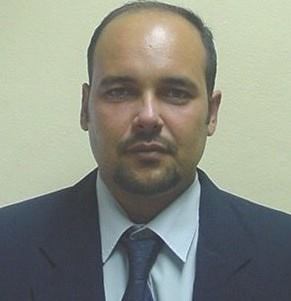
Translated by Y. R. Someillan
Somos+ Official Note on Barack Obama’s Visit to Cuba / Somos+
Somos+ (We Are More), Eliecer Avila, 18 February 2016 — The Somos+ Political Movement welcomes the upcoming visit of President of the United States Barack Obama to Cuba. This event confirms the willingness of his government to strengthen the bonds of friendship with our people.
There is evidence that the Cuban people feel respect and admiration for Obama, because, in practice, he has done more than Raul Castro to overcome the old patterns of the Cold War and to advance the search for new opportunities for the development, prosperity and freedom of the Cuban people. continue reading
During his visit Obama will be able to explain to us first hand the details of the changes in policy and the opportunities they open for both peoples. We are sure that he will be received in the streets here like a hero, an image that will contrast greatly with the “hatred toward the enemy neighbor” that they have tried to instill in us for more than half a century. And above all, it will be absolutely incompatible with the abominable and absurd repression against those accused of being “allies” of that “enemy.”
It must also be made very clear that it will not be Obama, nor the pope, nor anyone who is not of our own people who will resolve the profound problems that are strangling our nation. However, in this fight, every favorable wind is appreciated.
Going forward from today Cuba will experience a decisive chain of historic events that will mark its present and its future. President Obama’s visit will be one of them.
Naturally, Somos+ welcomes him and wishes him success.
Eliecer Avila, Engineer
President, Somos+ (We Are More)

